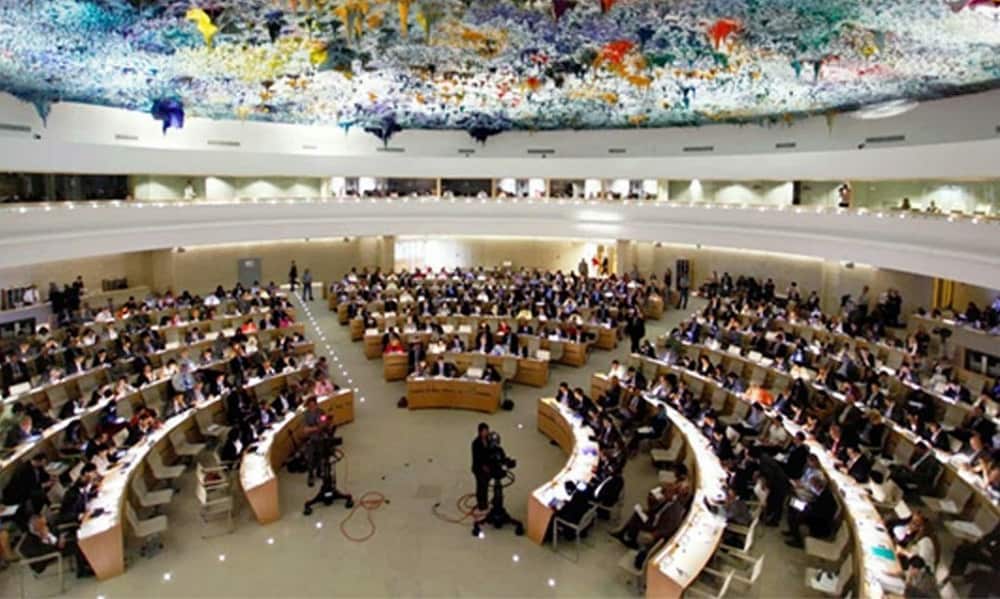
The recent sessions of the Human Rights Council, notably its 55th meeting on March 18th, brought to light the distressing developments in Iran’s approach to human rights under its current leadership
.
Javaid Rehman, the United Nations Special Rapporteur, presented a comprehensive report at the European headquarters of the United Nations in Geneva, detailing an alarming escalation in human rights abuses in Iran. This report follows a preliminary declaration by the United Nations Fact-Finding Mission on March 8th, which accused Tehran of committing crimes against humanity during the suppression of the 2022 uprising. These developments paint a grim picture of the human rights landscape in Iran, characterized by an array of egregious violations.
The Fact-Finding Mission’s findings on the use of disproportionate force to quash dissent and Rehman’s detailing of a 43% spike in executions in 2023 underscore the regime’s ruthless clampdown on any form of opposition. Rehman’s inability to access Iran, despite repeated requests, highlights the regime’s obstinacy and lack of transparency.
The violations reported include torture, mistreatment of prisoners, targeted killings of ethnic minorities, and suppression and discrimination against women and girls. Rehman also emphasized the urgent need for the international community to establish mechanisms for accountability to address not only recent atrocities but also long-standing violations dating back to significant events like the 1988 massacre and the November 2019 protests.
#Iran News in Brief
At the 55th session of the Human Rights Council, @JavaidRehman's UN report exposes a concerning 43% spike in executions in Iran, urging global attention to the escalating #humanrights crisis. Calls for justice for 1980 and 1988 massacres.… pic.twitter.com/S2BnyM1Ysq— NCRI-FAC (@iran_policy) March 18, 2024
In a telling response to these damning indictments, representatives from Iran attempted to dismiss the findings as baseless and politically motivated. However, this denial was met with skepticism, especially given the regime’s consistent obstruction of efforts to investigate and address these abuses.
The regime’s actions have not gone without international condemnation. The submission of the Truth-Finding Committee’s report, which categorically denounced the regime’s repressive tactics as crimes against humanity, has prompted calls for the cessation of executions and the release of political prisoners. Despite these calls, the regime remains defiant, with judiciary head Gholam-Hossein Mohseni Ejei attempting to discredit the findings, further highlighting the government’s refusal to confront its record.
A particularly poignant moment came from political prisoner Shabnam Madadzadeh, who, despite facing interruptions from Iranian representatives, courageously denounced the regime’s atrocities. Her speech underscored the ongoing suppression of dissent and the critical need for accountability and justice.
Sara Hossein, chairperson of @UN Independent International Fact-Finding Mission on Iran at #HRC55: highest number of deaths in a single day during the protests took place in Zahedan on #BloodyFrieday on 30 September 2022. @amnesty's analysis: https://t.co/QWoYhpwgk0
— Amnesty Iran (@AmnestyIran) March 18, 2024
As the Human Rights Council moves towards issuing resolutions to extend the mandates of the Special Rapporteur and the Truth-Finding Committee, the international community stands at a crossroads. The continued impunity at the national level in Iran poses a significant challenge, yet the work of entities like the Truth-Finding Committee shines a light of hope on the pursuit of justice and accountability. The regime’s aggression, both in public forums and behind the closed doors of its prisons, underscores a blatant disregard for human dignity, emphasizing the urgency of the situation and the need for sustained international attention and action.

MEK Iran (follow us on Twitter and Facebook), Maryam Rajavi’s on her site, Twitter & Facebook, NCRI (Twitter & Facebook), and People’s Mojahedin Organization of Iran – MEK IRAN – YouTu
